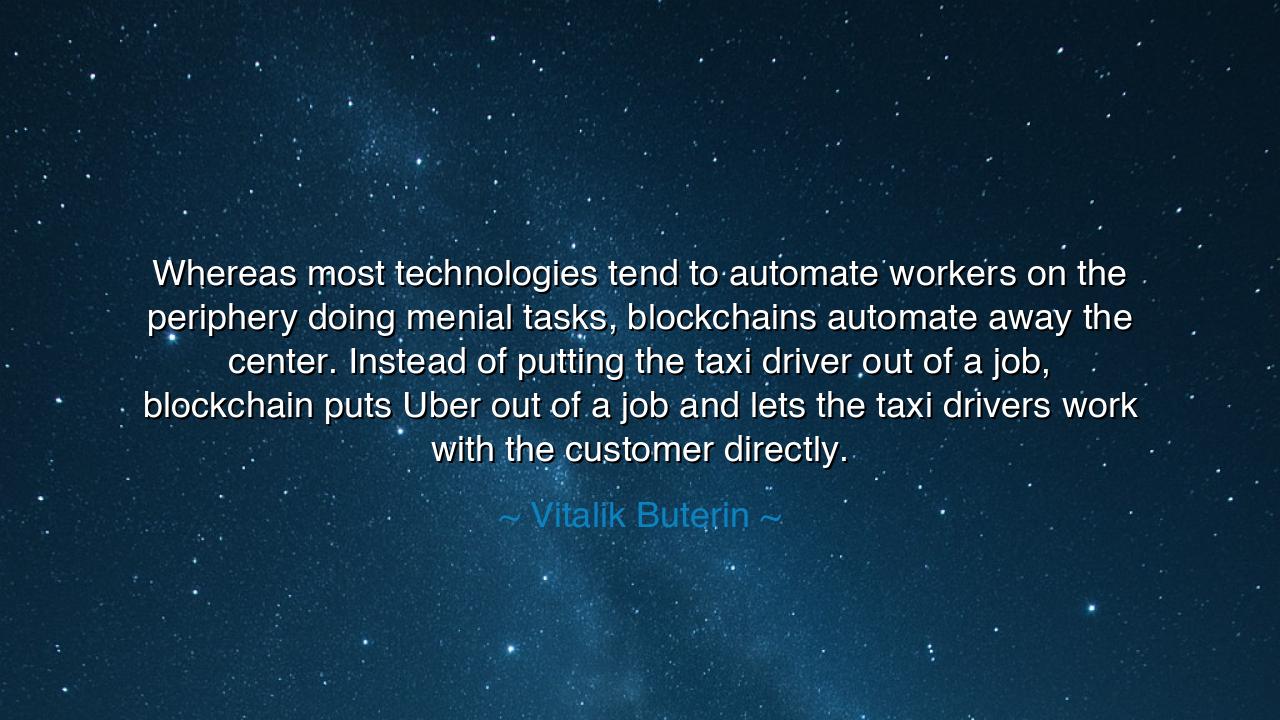
Whereas most technologies tend to automate workers on the
Whereas most technologies tend to automate workers on the periphery doing menial tasks, blockchains automate away the center. Instead of putting the taxi driver out of a job, blockchain puts Uber out of a job and lets the taxi drivers work with the customer directly.






In the ever-turning wheel of progress, technology has long shaped the fate of humankind. As Vitalik Buterin declares, “Whereas most technologies tend to automate workers on the periphery doing menial tasks, blockchains automate away the center.” These words reveal a profound shift in the balance of power. For in ages past, innovation often replaced the humble laborer, stripping him of his livelihood while strengthening the hands of those who rule from the heights. But now, a new force arises, not to crush the weak, but to challenge the mighty.
The center, in Buterin’s vision, represents the great intermediaries — the lords of commerce and command who stand between the people and their needs. In the old order, the taxi driver might lose his way of life to a faceless machine, while the master of the network, like Uber, grows ever richer. Yet, in the world of the blockchain, this order is turned upon its head. No longer does power flow through a single gatekeeper; the many can now meet each other directly, their hands clasping without a master standing between them.
Consider the parable he offers: “Instead of putting the taxi driver out of a job, blockchain puts Uber out of a job and lets the taxi drivers work directly with the customer.” This is more than a tale of drivers and fares; it is a vision of liberation. When the center is removed, trust is not dictated by a single throne but spread across the people themselves. Each individual becomes both free and accountable, bound not by decrees, but by the shared ledger of truth.
The origin of this idea lies deep in the human longing for fairness. Throughout history, empires have risen by centralizing power, only to fall when that power grew corrupt and unyielding. The blockchain is a modern response to this ancient problem: a structure without a single ruler, where transparency replaces tyranny. It is a digital echo of the early marketplaces and village councils, where people met face to face, bartering in honesty and equality.
Thus, let this teaching endure: beware the center that grows too powerful, for it will seek to bind the many in chains of dependence. Embrace the tools that return power to the edges, where the people live and labor. For in a world where all may work directly, without unjust masters, the balance of creation is restored, and technology becomes not the destroyer of freedom, but its most faithful servant.






MTLe Minh Thu
The way Vitalik Buterin explains blockchain’s impact on industries like ride-sharing makes me think about how other sectors might be affected in similar ways. If the middleman is eliminated, what happens to large corporations that profit from being the intermediary? Will this force them to rethink their business models, or will decentralization empower individuals to take more control over their work?
TBTran Thanh Binh
Buterin’s quote about blockchain eliminating the middleman, rather than directly affecting workers, is an interesting perspective. It brings up a bigger question about the role of centralized companies in modern industries. If blockchain truly disrupts the middle layer, how will these companies adjust, and what new opportunities might emerge for workers who would have otherwise been sidelined by them?
TPthai Pham
I really like Buterin’s take on blockchain. Instead of taking jobs away from individuals at the bottom of the hierarchy, blockchain removes the centralized systems that control industries. It makes me wonder, how much of this shift is a good thing for workers in the middle, like Uber drivers, and how much of it might actually make their work harder? Could decentralization lead to unexpected challenges?
THNguyen Thi Hong
Vitalik Buterin’s insight on blockchain technology is intriguing because it flips the traditional idea of automation on its head. Instead of eliminating jobs on the lower end, blockchain removes the middleman. It’s interesting to think about how this could affect industries like transportation or retail. Do you think this shift will be embraced widely, or will there be resistance from traditional intermediaries like Uber?